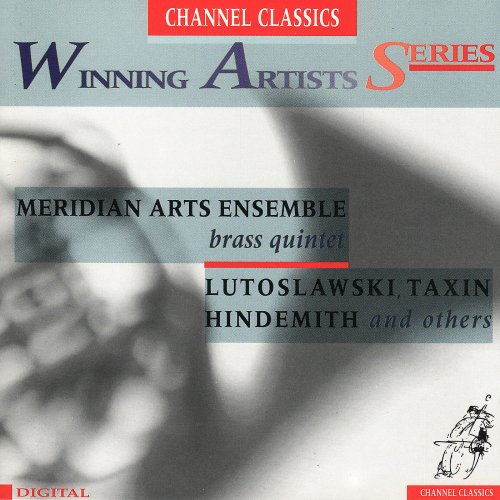
Meridian Arts Ensemble - Winning Artists Series - Lutoslawski, Taxin, Hindemith, etc. (1991)
BAND/ARTIST: Meridian Arts Ensemble
- Title: Winning Artists Series - Lutoslawski, Taxin, Hindemith, etc.
- Year Of Release: 1991
- Label: Channel Classics Records
- Genre: Classical
- Quality: FLAC (tracks + booklet)
- Total Time: 59:14
- Total Size: 200 MB
- WebSite: Album Preview
Tracklist:
1. Mini Overture (02:39)
2. Morgenmusik: I. Mäßig bewegt (02:46)
3. Morgenmusik: II. Langsame Viertel (01:45)
4. Morgenmusik: III. Bewegt (01:08)
5. Armenian Scenes: I. Morning Song (02:21)
6. Armenian Scenes: II. Drinking Song (01:21)
7. Armenian Scenes: III. Song of Grief (03:32)
8. Armenian Scenes: IV. Wedding Procession (01:40)
9. Brass Quintet (11:53)
10. Laudes: I. Reveille (05:06)
11. Laudes: II. Scherzo (01:49)
12. Laudes: III. Cantilena (04:07)
13. Laudes: IV. Volta (04:12)
14. Quintet for Brass Instruments: I. (03:56)
15. Quintet for Brass Instruments: II. (02:56)
16. Quintet for Brass Instruments: III. (03:43)
17. Quintet for Brass Instruments: IV. (04:12)
1. Mini Overture (02:39)
2. Morgenmusik: I. Mäßig bewegt (02:46)
3. Morgenmusik: II. Langsame Viertel (01:45)
4. Morgenmusik: III. Bewegt (01:08)
5. Armenian Scenes: I. Morning Song (02:21)
6. Armenian Scenes: II. Drinking Song (01:21)
7. Armenian Scenes: III. Song of Grief (03:32)
8. Armenian Scenes: IV. Wedding Procession (01:40)
9. Brass Quintet (11:53)
10. Laudes: I. Reveille (05:06)
11. Laudes: II. Scherzo (01:49)
12. Laudes: III. Cantilena (04:07)
13. Laudes: IV. Volta (04:12)
14. Quintet for Brass Instruments: I. (03:56)
15. Quintet for Brass Instruments: II. (02:56)
16. Quintet for Brass Instruments: III. (03:43)
17. Quintet for Brass Instruments: IV. (04:12)
Known internationally as a conductor of his own work, Witold Lutoslawski (b. Warsaw 1913) has also enjoyed a career as a pianist. He has taught and lectured on composition at Tanglewood, Dartmouth College and Copenhagen Conservatory. The composer has also won numerous prizes for his works, ranging from the Gesellschaft der Musikfreunde of Vienna to the International Koussevitsky Prize. Lutoslawski is perhaps best known for his ability to exercise creativity within a high level of discipline. Lutoslawski’s list of compositions include orchestral, vocal and chamber settings. Mini Overture was written and dedicated to Philip Jones and his wife Ursula. Paul Hindemith’s Morgenmusik (Morning music) is the opening work from the composer’s collection “Ploner Musiktag” (day of music at Plon), a series of instrumental and choral pieces written in 1932 for performance by students at a festival of youth in northern Germany. These pieces are among the final works in Hindemith’s catologue of Gebrauchsmusik (literally “utility music”), a term coined by Hindemith to describe music that was to be performed for a specific purpose, rather than the more common idea of “art for art’s sake”. This work evokes the traditional style of Renaissance brass playing, having been performed from the top of a tower to herald the opening of the day’s festivities. Morgenmusik is made up of three contrasting movements, the second of which is supposed to be played twice (as noted in the score). Because this work consists of chordal and contrapuntal texture, the musicians may explore in their performance qualities of the well known fanfare or clarion style, as well as a more singing and vocal approach. There is no specified instrumentation for Morgenmusik: there were numerous performers for each part when played in 1932. For this performance, the tuba doubles with the trombone on the bass part, resting in sections which lend themselves to a thinning of vertical texture. Born in 1920 in Erevan, Armenia, Alexander Arutiunian is one of the best known and highly esteemed composers of the Soviet Union. He studied composition and piano at the Komitas Conservatory in the city of his birth and later pursued further composition studies with H. Litinsky in Moscow. He currently directs the composition class at the Erevan State Conservatory….
As a ISRA.CLOUD's PREMIUM member you will have the following benefits:
- Unlimited high speed downloads
- Download directly without waiting time
- Unlimited parallel downloads
- Support for download accelerators
- No advertising
- Resume broken downloads


